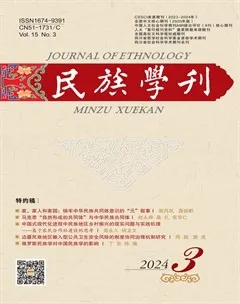The Evolution of Chinese Anthropology’s Overseas Ethnography from A Knowledge Network Perspective
(Institute of Ethnology and Anthropology, Chinese Academy of Social Sciences, Beijing, 100081, China)
JOURNAL OF ETHNOLOGY, VOL. 15, NO.03, 93-103, 2024 (CN51-1731/C, in Chinese)
DOI:10.3969/j.issn.1674-9391.2024.03.011
Abstract:
The production of knowledge within the field of anthropology while using ethnography as a normative method has proven to be valuable to the modern global knowledge system. Within Chinese social sciences, the academic practice of overseas ethnography has advanced Chinese anthropological research by encouraging scholars to engage in social empirical studies abroad and compose research reports. Over the past two decades, the evolution of overseas ethnography has not only broadened the research scope and methodological perspectives of Chinese anthropology but also laid the groundwork for enriching the global cognitive landscape with Chinese scholars assuming a prominent role as both subjects of study and contributors to the mode of knowledge dissemination. Consequently, this has created a multi-dimensional and dynamically constructed epistemological network.
At present, Chinese overseas ethnographers have undertaken extensive research in nearly 40 countries spanning five continents. Their investigations have encompassed a wide array of environments, from rural village temples and urban streets to corporate settings, forests, islands, and digital platforms. These studies have been particularly focused on “developing countries,” regions associated with the “Belt and Road” initiative, Southeast Asia, Africa, and Latin America. In addition to studying major ethnic groups, overseas Chinese, and indigenous populations, considerable attention has been given to mobile groups, commodities, capital flows, and technological exchanges within the context of globalization. Besides, the research themes have covered politics, economics, education, ecology, religion, art, heritage, and infrastructure. Through detailed micro-level case studies, these ethnographic approaches have been attempting to capture the comprehensive cultural and societal fabric of local communities. What is more, research approaches generally appear to have evolved from community-based studies and multi-sited ethnography to a more comprehensive ethnography of world society, from physically-grounded fieldwork to the incorporation of virtual ethnography based on social media, and from observational participation and in-depth interviews to comprehensive approaches integrating digital technologies. This substantial transformation arguably highlights unique strengths of social empirical research in social science.
The change and construction of overseas ethnographic knowledge networks are intricately intertwined, reflecting the agency of researchers and the systematic evolution of academic practice, knowledge production, and network presentation. Changes in structural order and developmental trends can be seen as characteristics of this process. “Culture” and “ethnic groups”, moreover, emerge as key concepts in overseas ethnography, where the notion of “dialogue” usually plays a pivotal role in theoretical and methodological innovation. Furthermore, recent years have witnessed an emergence of research areas such as the “Belt and Road” initiative and “Area Studies,” fueling new knowledge in overseas ethnography. Research also reveals that the driving forces behind the construction of these networks are specific practices rooted in the contextual realities of China’s national development and knowledge discourse construction.Internally, the initiative comes from the choice, flow, and dialogue of research subjects. Meanwhile, changes in knowledge production and knowledge consumption patterns potentially also influence the form of knowledge presentation.
To conclude, in response to the new trend of knowledge society development, researchers in overseas ethnography have the potential to deepen the significance of their case studies, strengthen academic networking, and contribute to advancing knowledge in overseas social empirical research. Thus, anthropological knowledge products may effectively be utilized to improve national comprehensive literacy and overall societal quality, serve multiple subjects, and promote exchange as well as mutual learning among cultures.
Key Words:
overseas ethnography; Chinese anthropology; empirical studies on overseas society; knowledge network; area studies
- 民族学刊的其它文章
- An Ethnographic Textual Analysis of Xiyu Wenjian Lu
- The Chinese Identity in the Creation Mythology of the Yi People
- Convergenc
- Influence of Russian Ethnology on Chinese Ethnology
- Foundation
- The Construction of Evaluation Indexes for Teachers in Minzu Colleges and Universities Using Student-Centered Approach

